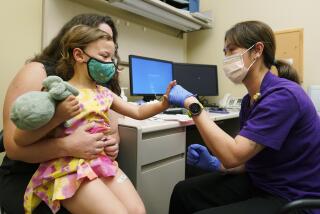Science / Medicine : Use of Ear Tubes Debated
- Share via
The most common reason for taking an infant to the pediatrician, other than routine checkups, is ear infection. And the most frequently performed operation on children, used to relieve the buildup of fluid in the middle ear that can accompany ear inflammation, is the implanting of tubes.
Although ear-tube operations have now surpassed tonsillectomies in frequency in the United States, pediatricians are still divided on their safety. One of the top experts in the field, Dr. Gunnar Stickler, a pediatrician at the Mayo Clinic in Rochester, Minn., has called for a moratorium on their use, even though prolonged high levels of fluid in the ear can impede the learning of speech and overall intellectual development. There are, Stickler said, too many risks associated with the procedure. Besides the overall danger of administering an anesthetic to a youngster, there can be permanent scarring of the eardrum, and in one of 200 operations the eardrum is accidentally perforated.
Dr. Charles Bluestone, an otolaryngologist at Children’s Hospital of Pittsburgh, however, takes a less critical view, saying there are cases in which there is no alternative to the insertion of ear tubes. For example, parents may have to consider ear tubes if their children are unresponsive or allergic to antibiotics or have had fluid in their ear for three months or longer.
One--and perhaps the only--way to help prevent ear infection, Bluestone said, may be prolonged nursing of babies. The fact that so many American women do not nurse beyond six months may be one of the reasons for what seems to be a dramatic rise in the incidence of middle ear infections, Bluestone said.




